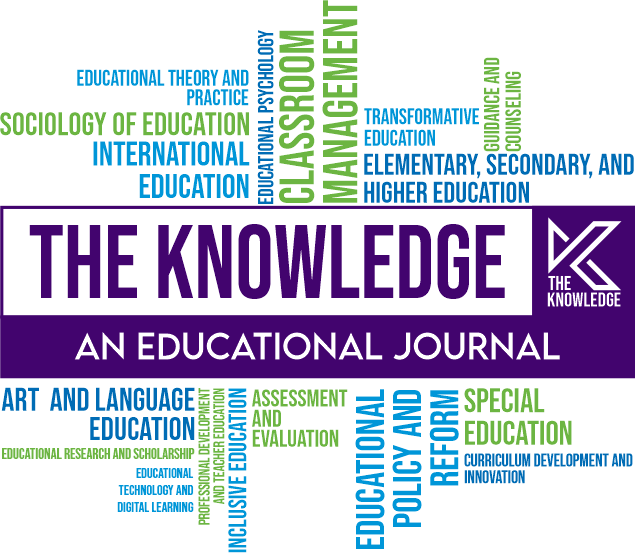Relationship between Social Responsibility and Social Response of Students at University Level
DOI:
https://doi.org/10.55737/tk/2k25b.42071Keywords:
Social Responsibility, Social Response, Students, University Level, EducationAbstract
This study was conducted to find out the relationship between social responsibility and social response of students at the university level. The study was descriptive in nature, and a survey method was used for data collection. The population of the study consisted of 1374 university students of University of Kotli Azad Jammu and Kashmir. A simple random sampling technique was used to select a sample of 300 students. A five-point Likert scale questionnaire was developed to collect responses from students. A self-developed questionnaire validated by two experts was used in this research. Data were collected through direct visits to sampled students. Statistical Package for Social Sciences (SPSS) software version 22 was used for data analysis. Frequency, percentage, and mean scores, standard deviation and Pearson’s correlation were applied to analyze the data. The study found that the students do not educate themselves about diverse cultures, indicating a lack of interest in cultural education. This could impact their ability to interact in diverse environments or contribute to inclusive practices. The study also concluded that there is a strong and positive relationship between Social Responsibility and Social Response. To improve cultural education, university authorities may focus on awareness campaigns, integrating multiculturalism into curricula and training programs, and organizing interactive activities.
References
Astin, A.W., & Sax, L.J. (1998). How undergraduates are affected by service participation. Journal of College Student Development, 39, 251-262. https://digitalcommons.unomaha.edu/cgi/viewcontent.cgi?article=1012&context=slcehighered
Butler, N., & Spoelstra, S. (2014). The regime of excellence and the erosion of ethos in critical management studies. British Journal of Management, 25(3), 538-550. https://doi.org/10.1111/1467-8551.12053
Chaudhry, S., Tandon, A., Shinde, S., & Bhattacharya, A. (2024). Student psychological well-being in higher education: The role of internal team environment, institutional, friends and family support and academic engagement. PLOS ONE, 19(1), e0297508. https://doi.org/10.1371/journal.pone.0297508
Coelho, M., & Menezes, I. (2021). University social responsibility, service learning, and students' personal, professional, and civic education. Frontiers in Psychology, 12. https://doi.org/10.3389/fpsyg.2021.617300
Corpuz, R. R. N., Manlutac, A. C., De Guzman, S. M. R., & Santos, C. J. P. (2023). Mitigating tourism fraud in northern and central Luzon-understanding factors affecting domestic tourists and enhancing trust in destination experiences. EPRA International Journal of Multidisciplinary Research (IJMR), 9(11), 154-168. https://doi.org/10.36713/epra14783
Domitrovich, C. E., Durlak, J. A., Staley, K. C., & Weissberg, R. P. (2017). Social‐emotional competence: An essential factor for promoting positive adjustment and reducing risk in school children. Child Development, 88(2), 408-416. https://doi.org/10.1111/cdev.12739
Holmes, M. (2023). Structure. In Organizing Occupy Wall Street: This is Just Practice (pp. 129-143). Singapore: Springer Nature Singapore.
Hooks, B. (2015). Choosing the margin as a space of radical openness. In Women, Knowledge, and Reality (pp. 48-55). Routledge.
Lee, J., & Thomas, R. (2023). Overcoming academic procrastination: A behavioral-cognitive approach. Journal of Student Research, 12(4). https://doi.org/10.47611/jsrhs.v12i4.5436
Lessa, C., & Coelho, A. (2024). The impact of social responsibility on students’ perceptions in higher education institutions: A theoretical synthesis of recent research and bibliometric analysis. Journal of Nonprofit & Public Sector Marketing, 36(5), 751-778. https://doi.org/10.1080/10495142.2024.2337648
Stone, A. (2022). Student perceptions of academic integrity: A qualitative study of understanding, consequences, and impact. Journal of Academic Ethics, 21(3), 357-375. https://doi.org/10.1007/s10805-022-09461-5
Tomlinson, C. A., & Imbeau, M. B. (2023). Leading and managing a differentiated classroom. ASCD.
Townsend, P. (2023). The last refuge: a survey of residential institutions and homes for the aged in England and Wales. Taylor & Francis.
Triastuti, A. (2020). Assessing English pre-service teachers’ knowledge base of teaching: Linking knowledge and self-portrayal. TEFLIN Journal - A publication on the teaching and learning of English, 31(1), 108. https://doi.org/10.15639/teflinjournal.v31i1/108-138
Tziner, A., & Persoff, M. (2024). The interplay between ethics, justice, corporate social responsibility, and performance management sustainability. Frontiers in Psychology, 15. https://doi.org/10.3389/fpsyg.2024.1323910
Waller, L., Walters, S., Satchell, N., Johnson, S., Daley, G., & Reid, H. (2023). Promoting democratic governance among the Jamaican youth through civic education: The experiences of the Uwi-Mona department of government's governance society. In Rethinking Democracy and Governance (pp. 244-261). Routledge.
Downloads
Published
Issue
Section
License
Copyright (c) 2025 Copyright in the THE KNOWLEDGE is retained by the author(s). Authors also grant any third party the right to use the article freely as long as its integrity is maintained and its original authors, citation details and publisher are identified.
This work is licensed under a Creative Commons Attribution-NonCommercial 4.0 International License.







